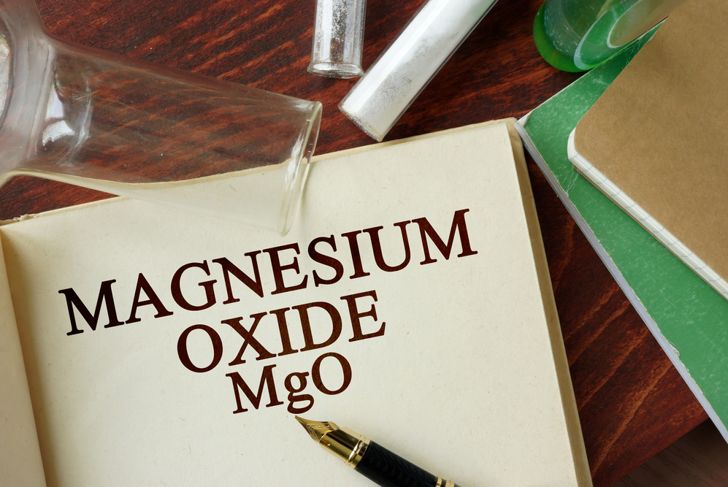Magnesium is the fourth most abundant mineral in the body, involved in hundreds of metabolic reactions related to blood pressure regulation, the production of energy, brain, muscle, and heart health, and more. Legumes, nuts, and whole grains are all good sources of magnesium, but you may still benefit from supplementation. If you are considering supplementing with magnesium, you have plenty of choices. Some types of magnesium are widely available in pharmacies, and others can be purchased in health food stores or online only. Each formula has a specific daily dosage. Knowing a little more about the benefits of magnesium citrate, malate, lactate, glycinate, sulfate, chloride, taurate, oxide, l-threonate, and orotate can help you make the best decision when selecting a supplement.
Magnesium Oxide
The combination of magnesium and oxygen results in magnesium oxide, the most common form of magnesium found in pharmacies. Available on its own as a capsule or powder, it is also the main ingredient in some supplements and many commercial over-the-counter medications for the relief of constipation. Magnesium oxide is generally best used as a laxative and to ease indigestion, heartburn, and other digestive symptoms. It is poorly absorbed by the body, though, and will not boost magnesium levels significantly.
Magnesium Citrate
Magnesium bound with citric acid, magnesium citrate is the second most common form you will find at drugstores and online. It is taken orally. Magnesium citrate is easily absorbed by the body and is sometimes recommended to correct magnesium deficiency, help improve sleep and promote relaxation. In high doses, it acts as a laxative.
Magnesium Malate
Malic acid is commonly found in wine and fruit. It is combined with magnesium to form magnesium malate. This type is easily absorbed by the body, making it a great choice for people hoping to boost their magnesium levels. For those worried about the laxative effect of magnesium citrate, magnesium malate is a good alternative because it has less laxative effect.
Magnesium Lactate
If you need to take larger doses of magnesium on a regular basis, magnesium lactate can be a good choice. A combination of magnesium and lactic acid, this type is gentle on the digestive tract and is well tolerated by most people. Magnesium lactate is often used as a food additive and is also available in supplement form. It seems to be more gentle on the digestive system and may help treat anxiety and stress.
Magnesium Glycinate
Combining magnesium with glycine, an amino acid, forms magnesium glycinate. Glycine on its own is used to help improve sleep patterns, so this combo is a popular choice for those taking magnesium for its sleep benefits. Additionally, magnesium glycinate may help reduce depression and anxiety. It is also well absorbed in the body.
Magnesium Sulfate
The combination of sulfur and oxygen with magnesium creates magnesium sulfate, or, more commonly, Epsom salt. Similar in appearance to table salt, Epsom salt can be taken orally as a laxative, but it has a strong, unpleasant taste.More often, magnesium sulfate is used as an additive to warm baths, to soak sore muscles and relax the body.
Magnesium Chloride
The addition of chlorine to magnesium creates magnesium chloride. It is readily absorbed by the body and can boost magnesium levels as well as act as a laxative. Magnesium chloride is also used in lotions as a topical option for easing muscle soreness. The benefits of this use, however, are not yet scientifically proven.
Magnesium Taurate
Magnesium and taurine, another amino acid, create magnesium taurate. There is some evidence that this particular type is beneficial in regulating blood sugar levels and reducing blood pressure. People wanting to boost their magnesium levels while improving their heart health may want to choose magnesium taurate.
9. Magnesium L-Threonate
Threonic acid and magnesium result in magnesium l-threonate. This type of magnesium is easily absorbed by the body and some research indicates it is particularly effective at boosting the amount of this vital mineral in the brain.Due to its ease of absorption by brain cells, magnesium l-theonate may be a good choice for people hoping to manage age-related memory loss, depression, and other related issues.
Magnesium orotate
Magnesium combined with orotic acid makes magnesium orotate, which has the benefit of being readily absorbed by the body without causing the laxative effect that occurs with many other types of magnesium.Magnesium orotate is pricier than other options but may be worth the investment for athletes and those hoping for heart-healthy benefits.While a specific type of magnesium could work for you, be sure to discuss taking any new supplements with your doctor, especially if you already take other medications.

 Home
Home Health
Health Diet & Nutrition
Diet & Nutrition Living Well
Living Well More
More




















